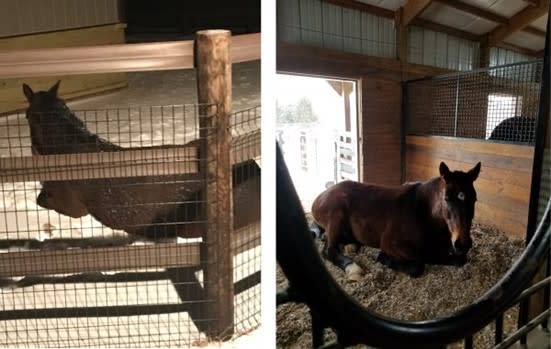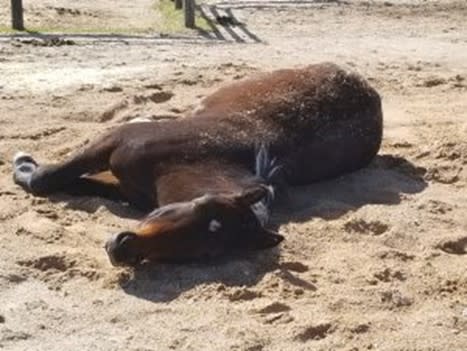Nap Time! When and Why Young Horses Lay Down & Sleep

Being a veterinarian, I’ve seen a lot of young horses in practice, everything from newborn foals to weanlings, yearlings, and on up. But going out to a farm a couple of times a year for physical exams, vaccinations, and even castrations doesn’t fully prepare you for the responsibility of the daily care and upbringing of a young horse.
One thing that constantly surprises me is the change in mood from one day to the next, and how short my guy’s attention span is (as well as how unpredictable his capacity for learning is on a Monday say, versus a Wednesday). But the biggest surprise to me has been how much a young horse lays down and sleeps!
How Often Do Young Horses Sleep?

Everyone knows very young foals that are still nursing take a lot of naps throughout the day, and that sunny days can drop even a whole herd of adult horses (except for the lookout horse, the “designated driver” so to speak of equine sleep). Still, I was not prepared for Stan Lee to take a nap from 9am to 12pm nearly every morning and to not be able to urge him onto his feet during this time.
On one occasion, I performed a complete physical examination while he was laying on the ground in his still, thinking he was colicking, only to have him eventually stand up, shake off, and eagerly check his feed tub.
Daytime, nighttime; inside, outside; sand, shavings, limestone, or even snow, Stan is an Equal-Opportunity Napper. I honestly think you could run a wheelbarrow over him when he’s “down for the count” and his eyes would barely flutter open. I’m sure he’ll grow out of this (I hope he grows out of it!) because it would be inconvenient to only be able to take lessons, attend clinics, or compete in the afternoons.

Sleeping as Horses Age
After the napping stage is over, your youngster may have boundless amounts of energy. It’s great timing for training and setting ground rules because their brains are still growing and developing rapidly. They pick up training techniques faster and can rebound from physical excursion faster than an older horse.
Depending on your horse, they may stay an avid napper well into their adult lives, and that's okay! It's normal for horses to sunbathe or lay down and sleep throughout the day, so let them catch up on their sleep. Remember what is usual sleeping behavior for your horse so you can spot when something like colic or dehydration might be setting in, not just sleepy pony mode. One of the most common signs of colic is a horse lying down and refusing to get up. So if you are ever worried, try to move them, then act accordingly.
DAN: "Horse sleep habits-- are there any unusual patterns that should cause concern, like not laying down enough, sleep position? My pony lays on her back sometimes. I've never seen that before." Neither have I. Please send us a photo.
DR. LYDIA GRAY: I have not seen that either.
DAN: It's very curious about that. "And what can you do to help encourage better sleep habits?"
DR. LYDIA GRAY: Well, I'm going to go back to laying on their back.
DAN: Yeah, that's a great one.
DR. LYDIA GRAY: Foals will lay on their back-- we call it "dorsal recumbency"-- when they have gastric ulcers. That's a very specific clinical sign and a very specific condition. But I've not seen or heard of an adult horse lying on their back.
If that's normal for her horse, like the one we just talked about, fine. But if that's only something that happens when there's a problem--
DAN: So if it's happening here and there--
DR. LYDIA GRAY: Yeah. Yeah. So that's very interesting. Otherwise, back to normal horses' sleeping habits. You've probably heard the whole thing about horses sleep standing up because they have a stay apparatus in their hind legs that let them doze while standing. And the key word there is "doze." Horses can lightly sleep sort of in a half-alert half-asleep manner. But that's not how they get full sleep.
And horses do have to get full sleep-- now, not as much as us. They only need like three to four hours of sleep a day and only 30 minutes of the REM, the Rapid Eye Movement.
DAN: Wow.
DR. LYDIA GRAY: And they can actually go a while-- you know-- maybe you don't know-- I know if you lose sleep, in a day or two-- as quickly as a day or two, you begin to feel the effects of it in your concentration, your focus.
DAN: Oh, I can feel it in one day.
DR. LYDIA GRAY: OK. Horses-- it could take like, seven, 10, 14 days before you start to see it. And what you'll see is when it's quiet and they're feeling comfortable and safe, they'll buckle their knee and collapse, and maybe fall. And people go, "Oh, he's narcoleptic." Ah, it's probably not. It's probably sleep deprivation, and what you're seeing is a sleep attack.
DAN: A sleep attack?
DR. LYDIA GRAY: A sleep attack. It's kind of an aggressive word for when things are calm, they just are like, "I'll just fall asleep." Sleep comes on them, and they can't help it.
DAN: And that's from consistently having poor sleep habits, not, for example, one bad night.
DR. LYDIA GRAY: Yeah, for example Dr. Joe Bertone is who I consider to be expert on horse sleep habits-- and he shares this story of a 4-H horse, pony that went to the county fairgrounds for their July, August county fair, and after a couple days, began to have these sleep attacks.
Well, they didn't know what was going on, so they called the vet. They're like, "Oh, something is terribly wrong. He's got some neurologic problem," right?
And one of the questions he asked-- a couple of questions he asked-- have you seen this horse roll lately? Or have you seen shavings on his back? So we'll get to that in a minute. Has anything changed in its social dynamics, like in the herd? And then how is the environment noise-wise? Are there any new disturbances?
Well, it turns out this poor horse was getting worked during the day and not having a normal routine-- well, like show in the morning, and show in the afternoon, and braiding, and bathing, and all that. And then at night, every night at 10 o'clock, they had fireworks.
And then at showgrounds, they'll leave the lights on in the barn all night long. He hadn't slept since he had been there, and it was just catching up with him. And they said when they got home, he slept for like two days straight flat-out, and then was his normal self again.
DAN: It's actually so funny they mention that. So for the showgrounds, is like keeping the lights on all the time-- I think people forget that. And one of our sponsor riders, Deanna Searles, what she says-- because when they go to Congress-- and they're there for like a month. So what she does is she'll get like a fly mask, and she'll put on the horses at night to help block some of the light for them.
DR. LYDIA GRAY: And maybe even like ear pom-poms or something.
DAN: Poor guy-- the fireworks going off every night, working all day.
DR. LYDIA GRAY: Yeah. And then people come in like at 3:00 and 4:00 AM to braid. So they may have just laid down to sleep, and then the lights are on again.
DAN: Time to get your hair done.
DR. LYDIA GRAY: Shows are rough. What else? What other questions do you have? Sleep habits, unusual patterns.
DAN: How can you encourage better sleep habits?
DR. LYDIA GRAY: Oh, yeah, how to encourage-- so I wrote down, what's required for a horse to sleep? Horses need to feel comfortable that they can lay down flat out and sleep because they're susceptible then to a predator. And they cannot get up fast and take off. If they're sleeping standing up, just dozing, and not really sleeping-- deep sleep or REM, they can quickly go. But when they lay flat out they're pretty susceptible.
DAN: They're vulnerable. Yeah.
DR. LYDIA GRAY: Yeah. They're very vulnerable. So they require a guard horse. And mares are very good at this.
So if you notice-- this is your observation-- in a herd, there'll be some laying down and some standing, watching over them. And they take turns. But you'll never see the entire herd laying flat out because somebody has to be on guard for the predators.
DAN: The got to sign for times of who's on watch, who's sleeping. Yeah.
DR. LYDIA GRAY: Shifts. Exactly, exactly. So that's one thing. There's a story of a horse that was in a herd, and then he got purchased, and he was the only horse in a place.
Well, he's like, I'm not laying down. I'm the only one. Then they come, they're going to get me. So they got another horse, a mini, and then it was fine.
DAN: So the mini was his guard horse so he could take a nap.
DR. LYDIA GRAY: Mini was a guard horse. I know. So let's see. What else?
The environment-- we talked about it has to be not disruptive, and usual, and the same. If it's disruptive but the horse is used to it, then that's probably fine.
The big one is-- and this one is probably the one that gets missed the most-- the horse has to be able to get down and get back up. So if you have an older horse maybe or a horse that's unsound-- and that's why the question of, have you seen them roll lately, or have you seen shavings on their back-- if they're not getting down and getting up, they can't sleep.
DAN: Yeah. Well, because the older ones, they are maybe a little bit nervous if they do, they can't get back up.
DR. LYDIA GRAY: As quickly.
DAN: Yeah.
DR. LYDIA GRAY: Yeah. Or just they're so stiff that they're hocks, and stifles, and fetlocks, they don't bend anymore. You've seen horses lay down. They don't look tremendously agile. So these older horses-- they might have been fused hocks or something. They can't do it.
DAN: If you give them a bigger stall, will that help them a little bit?
DR. LYDIA GRAY: That'll help-- more bedding. There's research study that says, thicker bedding-- horses will sleep longer. So it's good.
But also, this is a time to call your vet because they could come out and diagnose an unsoundness maybe and then prescribe something that will give them some relief, and talk to you about, let's develop a plan that will help your horse feel comfortable overall.
DAN: That's awesome. These are some great tips there. And some I might take just for my own personal use.